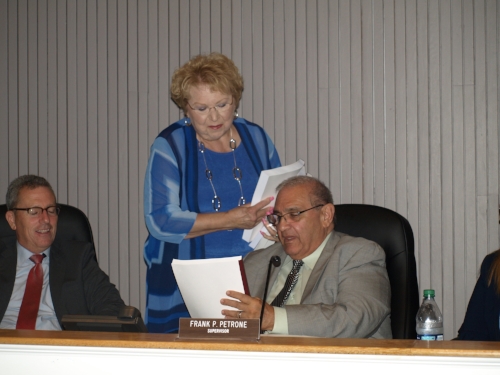Planned $194.2M Town Budget Is Supervisor Petrone’s Last
/Supervisor Frank Petrone accepts his last budget proposal from Town Clerk Jo-Ann Raia at Tuesday’s Town Board meeting. Long Islander News photo/ Connor Beach
By Connor Beach
cbeach@longislandergroup.com
Huntington Supervisor Frank Petrone presented a proposed $194.2 million budget for 2018 that calls for a $4.23 million increase in spending from the current year.
Petrone, who has served as supervisor since 1994, and announced he will not seek re-election this November, introduced the budget proposal at Tuesday’s town board meeting.
The town attributes a large portion of the proposed spending increase to rising healthcare costs; the 2018 budget proposal allocates $22.5 million for premium payments on town employees’ health insurance coverage, although the budget accounts for a decrease of about a dozen town employees.
The three major funds, general, highway and refuse district, provide the majority of money that fund services to residents. These three funds account for roughly $161 million, and fund administration, general services, public safety, human services, highway maintenance, recycling and sanitation.
The budget sports a proposed tax levy increase of 1.8 percent, or $2.12 million, which is within the state-mandated cap of 1.84 percent. The tax levy increase for the three major funds is 1.1 percent.
“We hold the line on spending, and we are just barely under the tax cap,” Petrone said. “We’ve held the line on debt service, and yet we have a few extra additional large projects that we hadn’t in the past, like the animal shelter and the Conte Center over at the Armory in Huntington Station.”
This year’s budget also includes $16.6 million in capital spending, including for the planned Conte Center, and $3 million for a new animal shelter planned to be built adjacent to Mill Dam Park in Halesite.
Petrone said the town has been working all year on the budget, and that the members of the board work together to achieve a balance of spending and budget cut.
He added, “Everybody understands that you need service and you need to provide quality of life, but at the same time there is a balance in terms of how much things cost.”







